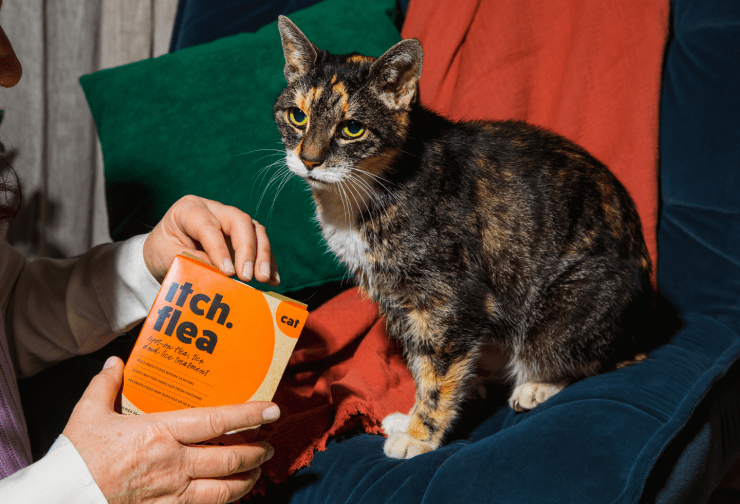Table of Contents

Preparing your cat for worming…
…And preparing yourself for worming!
The best methods for worming a cat
How to use Itch Wormer for cats
Don’t stress - Stay calm

Table of Contents

Preparing your cat for worming…
…And preparing yourself for worming!
The best methods for worming a cat
How to use Itch Wormer for cats
Don’t stress - Stay calm
As any cat owners will tell you, cats really don’t like to do what we ask of them, even at the best of times. This can be especially true where worming tablets are concerned! As much as your cat might hate taking their wormer (and as much as you might hate being the one who has to administer it) the reality is that they have to take it.
Without regular worming, cats are at risk from tapeworms, roundworms and other nasty worm parasites that can make both them and your family really poorly.
When it comes to worming your cat, it’s important to remember that just like most domestic animals, cats can pick up nervous energy from their owners.
To avoid stressing them out more, one of the best things you can do is to approach the task confidently and calmly.
Before you administer any worming tablets, always double-check the dosage your pet needs to avoid accidentally giving them too much in one sitting.
If you’re worried that the worming tablet is too big for them to swallow whole, just snap or break it in half.
Little and often is best - but if you find that you or your cat (or both of you!) are getting stressed, just take a break and try again later. If you’re really struggling, ask someone else to lend a hand.
Let’s not forget, cats are capable of inflicting some damage, especially if their ‘fight or flight’ instinct has kicked in.
Be prepared for scratches by covering your arms, and if you have a particularly feisty feline, add a couple of towels for extra padding.
If you need a bit of extra support, enlist a friend or family member that your cat is familiar with to help and ask them to administer the tablet while you hold your cat.
Tasty Treats
Without a doubt, the easiest way to give worming tablets to kittens or cats is with food!
Make sure that your pet is hungry, i.e. just before they are due to be fed their usual meal.
Hide the worming tablet in a small amount of food, either in their bowl or in your fingers.
If they still turn their nose up at you, try getting their mouth-watering by using a favourite treat like cheese, meat, or a bit of tuna.
Top tip - Butter is a great taste that cats love, and it will help the tablet slide more easily down their throat.
Trusty Towels
If your cat is too clever to fall for such food-related trickery, you’ll need to apply a little self-restraint and give the tablet by hand.
Pop your cat on a surface that isn’t slippery, and let them sit upright, facing away from you.
Use a mid-size towel and wrap it around them, holding their legs gently against their sides. This will help to control those front paws in case they try to wriggle!
When you’re ready to give them the worming tablet:
Tip your cat’s head back very gently, holding their mouth open.
Put the worm tablet in their throat, as far back as you can.
Let go of their head, letting them swallow.
Rubbing under their chin will encourage them to swallow
If you see them licking their lips, you’ll know it’s gone!
If this doesn’t work the first time, don’t worry, especially if it's your cat or kitten’s first treatment. Let your cat have a break and try again once you have both calmed down and your cat is more relaxed. Next time you try, aim to put the tablet a little bit further back on their tongue if possible.
We know how finickity felines are when it comes to taking worming tablets. Rest assured you’re not alone - so many cat owners are in the same boat! If you've tried the above tips and you're still in a pickle, call our qualified pet experts or talk to your vet for further advice.
Intestinal worms can cause serious health issues for your pet and your family, but with a regular de-worming schedule you can protect your pet, home and family from these persistent parasites.
Itch Wormer tablets kills all common intestinal worms and prevent larvae from hatching and multiplying, until your pet's next regular treatment.
Shop now


Intestinal worms are nasty wrigglers that can be a real bother for you, your family and your pet. Fortunately, you can prevent this being a problem with a regular pet worming routine. Follow our advice on regularly deworming your cat or dog to say goodbye to ringworms, tapeworms, whipworms and hookworms in no time.

As responsible pet owners, we all want the best for our furry friends. Regular health check-ups, a balanced diet, and proper grooming are all part of ensuring our pets live their best lives.
One essential aspect of pet care is deworming, which helps protect our furry friends from internal parasites that can cause a range of health issues. However, have you ever noticed that your pet seems unwell after taking those worming tablets?
In this post, we'll explore the common concerns related to worming tablets and your pet's health, addressing topics like the time it takes for worming tablets to work, potential side effects, and how to help your pet feel better.

Great news! When applied correctly, Itch Flea treatment for cats is 100% fast and effective at killing fleas on cats and kittens!
However, the 'when applied correctly' bit is quite important…
We know it's not always that easy, so we've put together a quick guide on the best way to apply Spot-On Flea treatment to your cat or kitten.